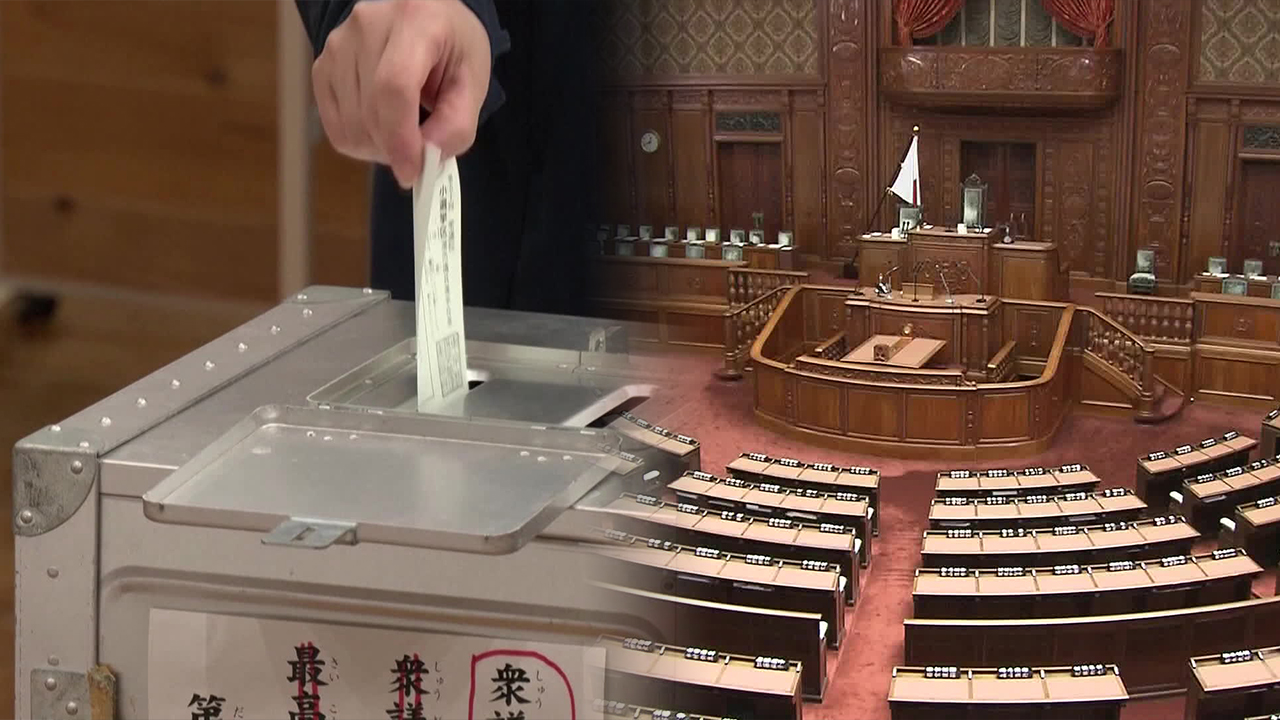Japan's Liberal Democratic Party fails to secure majority in House of Representatives
입력 2024.10.29 (00:22)
읽어주기 기능은 크롬기반의
브라우저에서만 사용하실 수 있습니다.
[Anchor]
In the results of the Japanese House of Representatives election, the ruling Liberal Democratic Party (LDP) has failed not only to secure a majority on its own but also to achieve a majority with its coalition partners.
This is analyzed as a reflection of accumulated dissatisfaction over issues such as slush funds, high prices, and the inability of the Kishida cabinet to differentiate itself from previous administrations.
This is Tokyo correspondent Hwang Jin-woo.
[Report]
The ruling Liberal Democratic Party of Japan has failed to secure a majority for its coalition partners, which it had set as the standard for winning the election.
The LDP won 191 seats, and its coalition partner, the Komeito Party, secured 24 seats, totaling 215 seats, which falls short of the majority of 233 seats.
This is the first time since losing power in 2009 that the two parties have missed a majority in the House of Representatives.
[Shigeru Ishiba / Prime Minister of Japan: "This harsh result is being accepted as a stern reprimand from the public regarding the party's reform stance."]
The accumulated dissatisfaction towards the LDP, stemming from factional politics, slush fund scandals, and prolonged high prices, is reflected in these results.
The failure of the Ishiba cabinet, which was launched earlier this month, to differentiate itself from the previous Kishida cabinet is also a contributing factor.
The main opposition party, the Constitutional Democratic Party, secured 148 seats, while the Japan Innovation Party and the Democratic Party for the People won 38 and 28 seats, respectively, giving them a casting vote in the governance of the country.
The voter turnout for this House of Representatives election was only 53.8%, once again demonstrating the political apathy of Japanese voters.
[Anchor]
Let's connect to Japan for more details on the situation.
Hwang Jin-woo, the Ishiba cabinet has lost significant power from the outset; will this affect the Prime Minister's ability to perform his duties?
[Reporter]
Yes, despite being elected as the LDP president with the support of non-factional members, the plan to dissolve the House of Representatives early and aim for a stable composition has instead resulted in a public judgment against him.
For now, he must worry about being re-nominated as Prime Minister.
In Japan, after a House of Representatives election, a special Diet session must be held within a month to nominate the Prime Minister.
Prime Minister Ishiba clearly expressed his intention to continue serving in a press conference today (10.28).
A majority vote is required for the Prime Minister's nomination, which means he needs cooperation from the opposition of 18 seats.
If the 250-seat opposition unites, a change of government is possible, but opinions suggest that it will be difficult due to the differing values and policies of each opposition party.
[Anchor]
What impact will the election results have on Japan-Korea relations?
[Reporter]
In Japan's parliamentary cabinet system, for the cabinet to exercise strong executive power, a stable number of seats must be secured.
For the past 12 years, the LDP has held a majority in the House of Councillors in conjunction with the Komeito Party and has secured an absolute majority in the House of Representatives on its own.
The LDP has monopolized 17 committee chair positions and held a majority in all committees, effectively creating a one-party rule.
Without stable seats backing it, many analysts believe it will be difficult to expect bold decisions or changes in Japan-Korea relations.
However, there are also assessments that, regardless of party affiliation, the trend towards improving Japan-Korea relations is viewed positively, suggesting that there will not be negative impacts.
This has been reported from Tokyo.
In the results of the Japanese House of Representatives election, the ruling Liberal Democratic Party (LDP) has failed not only to secure a majority on its own but also to achieve a majority with its coalition partners.
This is analyzed as a reflection of accumulated dissatisfaction over issues such as slush funds, high prices, and the inability of the Kishida cabinet to differentiate itself from previous administrations.
This is Tokyo correspondent Hwang Jin-woo.
[Report]
The ruling Liberal Democratic Party of Japan has failed to secure a majority for its coalition partners, which it had set as the standard for winning the election.
The LDP won 191 seats, and its coalition partner, the Komeito Party, secured 24 seats, totaling 215 seats, which falls short of the majority of 233 seats.
This is the first time since losing power in 2009 that the two parties have missed a majority in the House of Representatives.
[Shigeru Ishiba / Prime Minister of Japan: "This harsh result is being accepted as a stern reprimand from the public regarding the party's reform stance."]
The accumulated dissatisfaction towards the LDP, stemming from factional politics, slush fund scandals, and prolonged high prices, is reflected in these results.
The failure of the Ishiba cabinet, which was launched earlier this month, to differentiate itself from the previous Kishida cabinet is also a contributing factor.
The main opposition party, the Constitutional Democratic Party, secured 148 seats, while the Japan Innovation Party and the Democratic Party for the People won 38 and 28 seats, respectively, giving them a casting vote in the governance of the country.
The voter turnout for this House of Representatives election was only 53.8%, once again demonstrating the political apathy of Japanese voters.
[Anchor]
Let's connect to Japan for more details on the situation.
Hwang Jin-woo, the Ishiba cabinet has lost significant power from the outset; will this affect the Prime Minister's ability to perform his duties?
[Reporter]
Yes, despite being elected as the LDP president with the support of non-factional members, the plan to dissolve the House of Representatives early and aim for a stable composition has instead resulted in a public judgment against him.
For now, he must worry about being re-nominated as Prime Minister.
In Japan, after a House of Representatives election, a special Diet session must be held within a month to nominate the Prime Minister.
Prime Minister Ishiba clearly expressed his intention to continue serving in a press conference today (10.28).
A majority vote is required for the Prime Minister's nomination, which means he needs cooperation from the opposition of 18 seats.
If the 250-seat opposition unites, a change of government is possible, but opinions suggest that it will be difficult due to the differing values and policies of each opposition party.
[Anchor]
What impact will the election results have on Japan-Korea relations?
[Reporter]
In Japan's parliamentary cabinet system, for the cabinet to exercise strong executive power, a stable number of seats must be secured.
For the past 12 years, the LDP has held a majority in the House of Councillors in conjunction with the Komeito Party and has secured an absolute majority in the House of Representatives on its own.
The LDP has monopolized 17 committee chair positions and held a majority in all committees, effectively creating a one-party rule.
Without stable seats backing it, many analysts believe it will be difficult to expect bold decisions or changes in Japan-Korea relations.
However, there are also assessments that, regardless of party affiliation, the trend towards improving Japan-Korea relations is viewed positively, suggesting that there will not be negative impacts.
This has been reported from Tokyo.
■ 제보하기
▷ 카카오톡 : 'KBS제보' 검색, 채널 추가
▷ 전화 : 02-781-1234, 4444
▷ 이메일 : kbs1234@kbs.co.kr
▷ 유튜브, 네이버, 카카오에서도 KBS뉴스를 구독해주세요!
- Japan's Liberal Democratic Party fails to secure majority in House of Representatives
-
- 입력 2024-10-29 00:22:11

[Anchor]
In the results of the Japanese House of Representatives election, the ruling Liberal Democratic Party (LDP) has failed not only to secure a majority on its own but also to achieve a majority with its coalition partners.
This is analyzed as a reflection of accumulated dissatisfaction over issues such as slush funds, high prices, and the inability of the Kishida cabinet to differentiate itself from previous administrations.
This is Tokyo correspondent Hwang Jin-woo.
[Report]
The ruling Liberal Democratic Party of Japan has failed to secure a majority for its coalition partners, which it had set as the standard for winning the election.
The LDP won 191 seats, and its coalition partner, the Komeito Party, secured 24 seats, totaling 215 seats, which falls short of the majority of 233 seats.
This is the first time since losing power in 2009 that the two parties have missed a majority in the House of Representatives.
[Shigeru Ishiba / Prime Minister of Japan: "This harsh result is being accepted as a stern reprimand from the public regarding the party's reform stance."]
The accumulated dissatisfaction towards the LDP, stemming from factional politics, slush fund scandals, and prolonged high prices, is reflected in these results.
The failure of the Ishiba cabinet, which was launched earlier this month, to differentiate itself from the previous Kishida cabinet is also a contributing factor.
The main opposition party, the Constitutional Democratic Party, secured 148 seats, while the Japan Innovation Party and the Democratic Party for the People won 38 and 28 seats, respectively, giving them a casting vote in the governance of the country.
The voter turnout for this House of Representatives election was only 53.8%, once again demonstrating the political apathy of Japanese voters.
[Anchor]
Let's connect to Japan for more details on the situation.
Hwang Jin-woo, the Ishiba cabinet has lost significant power from the outset; will this affect the Prime Minister's ability to perform his duties?
[Reporter]
Yes, despite being elected as the LDP president with the support of non-factional members, the plan to dissolve the House of Representatives early and aim for a stable composition has instead resulted in a public judgment against him.
For now, he must worry about being re-nominated as Prime Minister.
In Japan, after a House of Representatives election, a special Diet session must be held within a month to nominate the Prime Minister.
Prime Minister Ishiba clearly expressed his intention to continue serving in a press conference today (10.28).
A majority vote is required for the Prime Minister's nomination, which means he needs cooperation from the opposition of 18 seats.
If the 250-seat opposition unites, a change of government is possible, but opinions suggest that it will be difficult due to the differing values and policies of each opposition party.
[Anchor]
What impact will the election results have on Japan-Korea relations?
[Reporter]
In Japan's parliamentary cabinet system, for the cabinet to exercise strong executive power, a stable number of seats must be secured.
For the past 12 years, the LDP has held a majority in the House of Councillors in conjunction with the Komeito Party and has secured an absolute majority in the House of Representatives on its own.
The LDP has monopolized 17 committee chair positions and held a majority in all committees, effectively creating a one-party rule.
Without stable seats backing it, many analysts believe it will be difficult to expect bold decisions or changes in Japan-Korea relations.
However, there are also assessments that, regardless of party affiliation, the trend towards improving Japan-Korea relations is viewed positively, suggesting that there will not be negative impacts.
This has been reported from Tokyo.
In the results of the Japanese House of Representatives election, the ruling Liberal Democratic Party (LDP) has failed not only to secure a majority on its own but also to achieve a majority with its coalition partners.
This is analyzed as a reflection of accumulated dissatisfaction over issues such as slush funds, high prices, and the inability of the Kishida cabinet to differentiate itself from previous administrations.
This is Tokyo correspondent Hwang Jin-woo.
[Report]
The ruling Liberal Democratic Party of Japan has failed to secure a majority for its coalition partners, which it had set as the standard for winning the election.
The LDP won 191 seats, and its coalition partner, the Komeito Party, secured 24 seats, totaling 215 seats, which falls short of the majority of 233 seats.
This is the first time since losing power in 2009 that the two parties have missed a majority in the House of Representatives.
[Shigeru Ishiba / Prime Minister of Japan: "This harsh result is being accepted as a stern reprimand from the public regarding the party's reform stance."]
The accumulated dissatisfaction towards the LDP, stemming from factional politics, slush fund scandals, and prolonged high prices, is reflected in these results.
The failure of the Ishiba cabinet, which was launched earlier this month, to differentiate itself from the previous Kishida cabinet is also a contributing factor.
The main opposition party, the Constitutional Democratic Party, secured 148 seats, while the Japan Innovation Party and the Democratic Party for the People won 38 and 28 seats, respectively, giving them a casting vote in the governance of the country.
The voter turnout for this House of Representatives election was only 53.8%, once again demonstrating the political apathy of Japanese voters.
[Anchor]
Let's connect to Japan for more details on the situation.
Hwang Jin-woo, the Ishiba cabinet has lost significant power from the outset; will this affect the Prime Minister's ability to perform his duties?
[Reporter]
Yes, despite being elected as the LDP president with the support of non-factional members, the plan to dissolve the House of Representatives early and aim for a stable composition has instead resulted in a public judgment against him.
For now, he must worry about being re-nominated as Prime Minister.
In Japan, after a House of Representatives election, a special Diet session must be held within a month to nominate the Prime Minister.
Prime Minister Ishiba clearly expressed his intention to continue serving in a press conference today (10.28).
A majority vote is required for the Prime Minister's nomination, which means he needs cooperation from the opposition of 18 seats.
If the 250-seat opposition unites, a change of government is possible, but opinions suggest that it will be difficult due to the differing values and policies of each opposition party.
[Anchor]
What impact will the election results have on Japan-Korea relations?
[Reporter]
In Japan's parliamentary cabinet system, for the cabinet to exercise strong executive power, a stable number of seats must be secured.
For the past 12 years, the LDP has held a majority in the House of Councillors in conjunction with the Komeito Party and has secured an absolute majority in the House of Representatives on its own.
The LDP has monopolized 17 committee chair positions and held a majority in all committees, effectively creating a one-party rule.
Without stable seats backing it, many analysts believe it will be difficult to expect bold decisions or changes in Japan-Korea relations.
However, there are also assessments that, regardless of party affiliation, the trend towards improving Japan-Korea relations is viewed positively, suggesting that there will not be negative impacts.
This has been reported from Tokyo.
-
-

황진우 기자 simon@kbs.co.kr
황진우 기자의 기사 모음
-
이 기사가 좋으셨다면
-
좋아요
0
-
응원해요
0
-
후속 원해요
0















이 기사에 대한 의견을 남겨주세요.